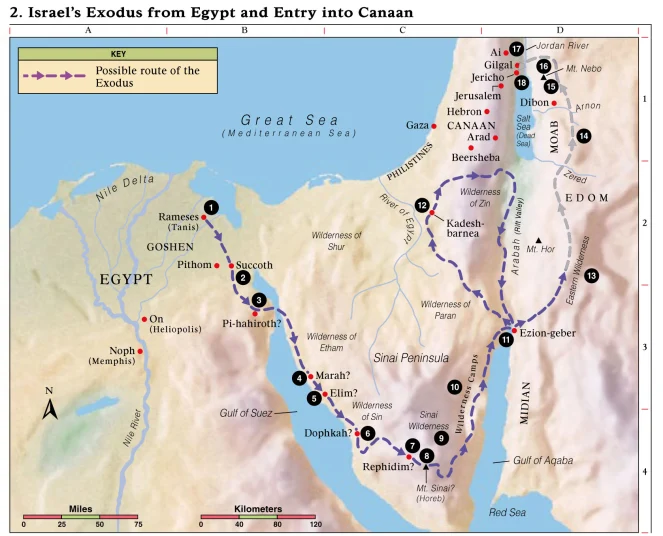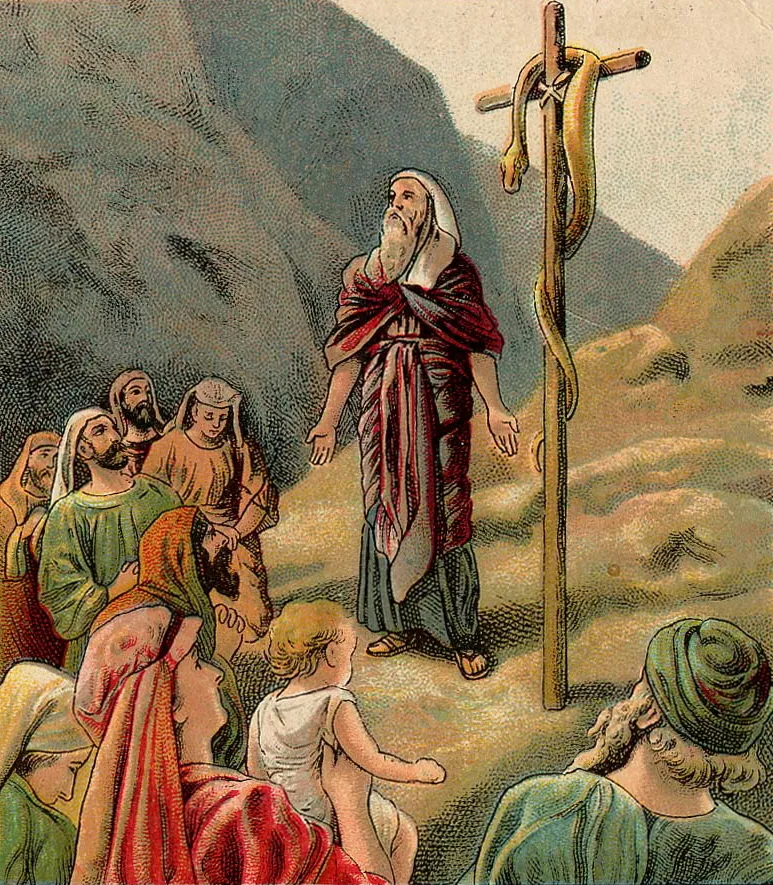I. Intro: The ancient truth and wisdom of the Word applied to our lives.
A. Do you ever wish you could go back in time with the knowledge, wisdom and experience that you have now?
1. Nate Bargatze: “I would be the worst time traveler. I wouldn’t be able to prove that I was from the future.”
a. From land lines to cell phones but unable to explain how they work.
b. Satellites: big things in the sky that don’t fall down.
c. Who is the 34th president? I have no idea.
2. The point is that even if this were possible, it wouldn’t do any good.
B. The good news is that we have something even better than the ability to go back in time.
1. We have been given a unique collection of historical events that have been specifically chosen by God to teach us everything we need to know to live a holy life.
2. Instead of traveling back in time, we can look to the Word of God and learn everything that we need to know for our lives today. Scripture is a better guide than hindsight.
3. Romans 15:4
“For whatever things were written before were written for our learning, that we through the patience and comfort of the Scriptures might have hope.”
4. 1 Cor 10:11
“Now all these things happened to them as examples, and they were written for our admonition (instruction), upon whom the ends of the ages have come.”
5. These lessons cost the people who learned them a great deal of pain, suffering and endurance, so we should listen and take to heart what the scripture records, because we benefit from their tribulation.
a. Psalm 102 is a Psalm of distress and crying out to God.
b. Vs 18 “This will be written for the generation to come, that a people yet to be created may praise the Lord.”
C. Prayer exercise: “Lord, what lesson from the scriptures applies to us right now?”
1. Since these things were written for our instruction, we can pray and ask the Lord for the specific passage of scripture that we need for each specific situation.
a. Even if we could travel back in time, to when would we go? What age?
b. We can trust the Holy Spirit to lead us to the right passage at the right time.
2. John 16:14&15 Jesus said the Holy Spirit will take of what is Mine and declare it to you. And it will always be the truth, because He is the Spirit of Truth. (16:13)
3. I urge you to pray this way for the challenges that you are facing. Exercise your faith.
a. Jeremiah 6:16 “Thus says the Lord: “Stand in the ways and see, and ask for the old paths, where the good way is, and walk in it; then you will find rest for your souls.”
4. I prayed and asked the Lord what lesson from the scripture applies to us at TRC right now. What example do we need from the lives of the saints who’ve gone before us? What specific passage?
II. Fiery Words and Fiery Serpents.
A. Backstory. (Numbers 21:4-9)
1. The events of this passage take place in year 40 of Israel’s wandering in the wilderness, just weeks or months before crossing the Jordan and entering the promised land.
2. This represents a significant threshold crossing in God’s timeline for His people. This was a kairos time, or an appointed time, a time that was set by the Lord for their crossing the Jordan and entering the promise.
3. What we see is that even though they were so close to breakthrough, the people became discouraged and impatient. This caused them to sin with their mouths by complaining against the Lord and against His leadership.
4. The lead up:
a. Vs 1-3 defeated an enemy and saved the people who were captured.
b. Near the end of 40 yrs of wandering, the time was set by God & known to them.
c. Always had food and water from the Lord.
5. Even though they were so close to the fulfillment of God’s promises for them, they became discouraged and almost gave up. They were so close to the end of the wilderness experience and the beginning of the promise land experience, but they became negative and pessimistic.
B. The text: Numbers 21:4-9
4 Then they journeyed from Mount Hor by the Way of the Red Sea, to go around the land of Edom; and the soul of the people became very discouraged on the way. 5 And the people spoke against God and against Moses: “Why have you brought us up out of Egypt to die in the wilderness? For there is no food and no water, and our soul loathes this worthless bread.”
6 So the Lord sent fiery serpents among the people, and they bit the people; and many of the people of Israel died.
7 Therefore the people came to Moses, and said, “We have sinned, for we have spoken against the Lord and against you; pray to the Lord that He take away the serpents from us.” So Moses prayed for the people.
8 Then the Lord said to Moses, “Make a fiery serpent, and set it on a pole; and it shall be that everyone who is bitten, when he looks at it, shall live.” 9 So Moses made a bronze serpent, and put it on a pole; and so it was, if a serpent had bitten anyone, when he looked at the bronze serpent, he lived.
C. The synopsis.
1. 1 Cor 10:9-11 gives us a great summary of this event.
9 nor let us tempt (test) Christ, as some of them also tempted, and were destroyed by serpents; 10 nor complain, as some of them also complained, and were destroyed by the destroyer. 11 Now all these things happened to them as examples, and they were written for our admonition, upon whom the ends of the ages have come.
2. Because they grew discouraged, they tried the Lord’s patience by complaining and criticizing against Him and His leadership.
a. They lost focus on what God was doing among them and many were destroyed right before they could enter the promised land.
b. 40 years of wandering and waiting were wasted 6 months to a year before crossing the Jordan because of words spoken from a critical heart.
3. Out of all the events that took place in those 40 years of wandering, the Holy Spirit selected this one to be written into the eternal record of scripture for our instruction in the last days.
4. The Hebrews were at a critical time. They were just about to start living where they belonged. The Lord was just about to settle them in a place where they can build, plant, grow and establish themselves. A place where their identity matched their authority. They will be able to say to their enemies, “Go away, I belong here! God has placed me here in this place.”
5. This speaks to where many of us are at the moment. We are at a threshold in the Spirit, a kairos time, a time that the Lord has set for us to come into a greater expression of our identity and a greater ability to understand and use our authority in the Lord. And yet, just before we fully cross over into this new territory, many of us are tempted with discouragement and we become impatient. We often sin against the Lord, His leadership and each other with our mouth.
6. Scripture is timeless because human struggles don’t change—discouragement, complaining, unbelief are still with us today and the Bible still speaks to those issues.
III. The Breakdown.
A. Vs 4.

1. Vs 4 “…the soul of the people became very discouraged along the way.”
a. Soul: mind, will, emotions (wants to understand, have its way & feel good)
2. Whenever we don’t understand why God allows things, whenever we don’t get our way & whenever we don’t feel happy about our circumstances, the door is opened to discouragement.
a. Discouragement will keep us from looking at all that God has brought us through, all that God has done on our behalf and put our focus on all that we don’t like at the moment.
b. It will keep us from recognizing the set times of the Lord.
c. Discouragement can cause us to miss the moment.
3. Out of that discouragement, that bitterness of soul, we often sin with our mouth.
a. Grumbling, complaining, murmuring, criticism, etc.
b. We tend to think that there is nothing wrong with this talk because we’re expressing our feelings, but it crosses the line when we speak against God & His leadership.
B. Vs 5.
1. Vs 5 “Why have you brought us up out of Egypt to die in the wilderness? For there is no food and no water, and our soul loathes this worthless bread.”
a. They said this in Exodus 14 when they faced the Red Sea crossing.
b. “No food and no water” a blatant lie, a gross exaggeration.
c. “…our soul loathes this worthless bread.”
d. They treated God’s miraculous provision with contempt and disdain.
2. Another result of letting discouragement take over our heart is that we lose focus on what God said He would do, what He is doing and what He is about to do.
a. It’s one thing to ponder the ways of God in our heart.
b. It’s another thing altogether to verbally doubt God’s present work in our lives and criticize what He has already done.
3. Discouragement in the present will steal our focus away from the promise.
4. And this often happens at critical times.
a. The ordinary times, the mundane times, the boring times are the critical times.
b. Battles are won by preparation before they are ever fought. (And lost that way.)
C. Vs 6&7.
1. Vs 6 “So the Lord sent fiery serpents among the people, and they bit the people; and many of the people of Israel died.”
a. Fiery words attract fiery serpents, they are words that sting the soul.
b. Words that criticize, complain, grumble, murmur, etc.
c. Criticism, complaining, grumbling, murmuring, etc…. words of venom, poison.
d. James 3:6 “…the tongue is a fire…”
2. Examples: (All of these are sins of speech, sabotage of speech.)
a. Zechariah: he doubted Gabriel’s message and his mouth had to be stopped.
b. Peter: denied Jesus three times before He was crucified.
c. David: older brother Eliab criticized him before he slew Goliath
3. A single match can burn down an entire forest. A single snakebite can poison the whole body. A critical word can destroy God’s purpose in your life.
D. Vs 7-9 Breakdown.

1. Finally they realize their sin and confessed to Moses. Moses prayed and God provided a solution.
2. Vs 8&9
8 Then the Lord said to Moses, “Make a fiery serpent, and set it on a pole; and it shall be that everyone who is bitten, when he looks at it, shall live.” 9 So Moses made a bronze serpent, and put it on a pole; and so it was, if a serpent had bitten anyone, when he looked at the bronze serpent, he lived.
3. This is a great prophetic picture of the Lord Jesus on the cross. It can be hard for us to imagine a bronze serpent lifted up on a pole and think of Jesus, but the reality is that He took on our sin and was crucified to wash us clean of it.
4. John 3:14-16 (Jesus speaking to Nicodemus)
14 And as Moses lifted up the serpent in the wilderness, even so must the Son of Man be lifted up, 15 that whoever believes in Him should not perish but have eternal life. 16 For God so loved the world that He gave His only begotten Son, that whoever believes in Him should not perish but have everlasting life.
5. Bronze speaks of judgment and salvation. The judgment for our sin was laid upon Jesus and His death provided for our salvation.
6. Here we see the mercy of God in the death of His Son for us. God is saying…“Even though you doubted Me, even though you criticized My goodness to you, My Son will take your sin on Himself and pay the penalty for it. If you look to Him, you will be saved from death, cleansed from your sin and made whole again.”
IV. Application.
A. Guard your heart.
1. Proverbs 4:23 “Keep your heart with all diligence, for out of it spring the issues of life.”
2. Guard your heart in the in-between times. This incident took place right after a major victory and right before a major breakthrough.
3. Discouragement often sneaks in during the mundane times, the waiting times, the in-between times.
4. Phil 4:11-13 Learn to be content in every situation.
11 Not that I speak in regard to need, for I have learned in whatever state I am, to be content: 12 I know how to be abased, and I know how to abound. Everywhere and in all things I have learned both to be full and to be hungry, both to abound and to suffer need. 13 I can do all things through Christ who strengthens me.
B. Guard your words.
1. The course of our life is set by the words we speak.
2. We must grow and develop the ability to pause between what we feel and we say.
a. We can acknowledge the feelings without letting them loose to start a fire.
3. Psalm 141:3 “Set a guard, O Lord, over my mouth; keep watch over the door of my lips.
C. Look to Jesus.
1. Even though there were snakes all over the ground, God had Moses tell the people to look up at the bronze serpent.
2. Keep your looking to Jesus, not at the snakes on the ground. We have to get our focus back on the Lord and His promise instead of our present circumstances.
3. If you can’t, ask Him to gently lift your gaze up to Him, He is the glory and the lifter of your head.
4. Psalm 3:3 “But You, O Lord, are a shield for me, my glory and the One who lifts up my head.”
V. Closing.
A. Getting beneath our discouragement.
1. I think that at the core of this feeling is a desire for what we want instead of desiring what we need.
2. We want more than what God is currently giving us, and so we begin to despise His gifts, provision and blessing in the present.
3. Practicing gratitude is one of the most reliable ways to overcome discouragement.
4. We can start by being grateful for God’s greatest gift to us. The eternal Son of God, holy, pure and almighty. All things were created through Him, by Him and for Him. Greater than the angels, equal with God the Father and Spirit, tested in every way and yet without ever sinning once. He lowers Himself in the greatest act of humility in the history of the universe to identify with us and take our sin upon Himself so that we could be whole again.
B. Don’t give up when you are so close to crossing the finish line.
1. Imagine a runner nearing the end of their first marathon and at someplace in the last mile they get discouraged and quit. They just stop running, walk off the course and sit down on the sidewalk.
2. After all the training, discipline and dieting. After all the daily runs and months of building up stamina, they decide it’s just too much and quit the race just before they finish.
3. We need to keep our thoughts on the finish line, not on the present discomfort.
C. Closing.
1. Israel’s story warns us that the greatest danger isn’t the desert outside of us—it’s the discouragement inside of us.
2. Discouragement leads to complaining, complaining leads to fiery words, and fiery words invite fiery serpents.
3. But God has given us a greater remedy: the cross of Jesus Christ. When we lift our eyes off the snakes at our feet and fix them on the Savior lifted high, the poison loses its power.
4. So guard your heart, guard your words, and keep your eyes on Jesus. When discouragement whispers, answer it with gratitude. When criticism rises, answer it with worship. And when the enemy comes slithering with venom, lift your eyes to the cross and remember—the Son of Man was lifted up so that whoever looks to Him will live.

